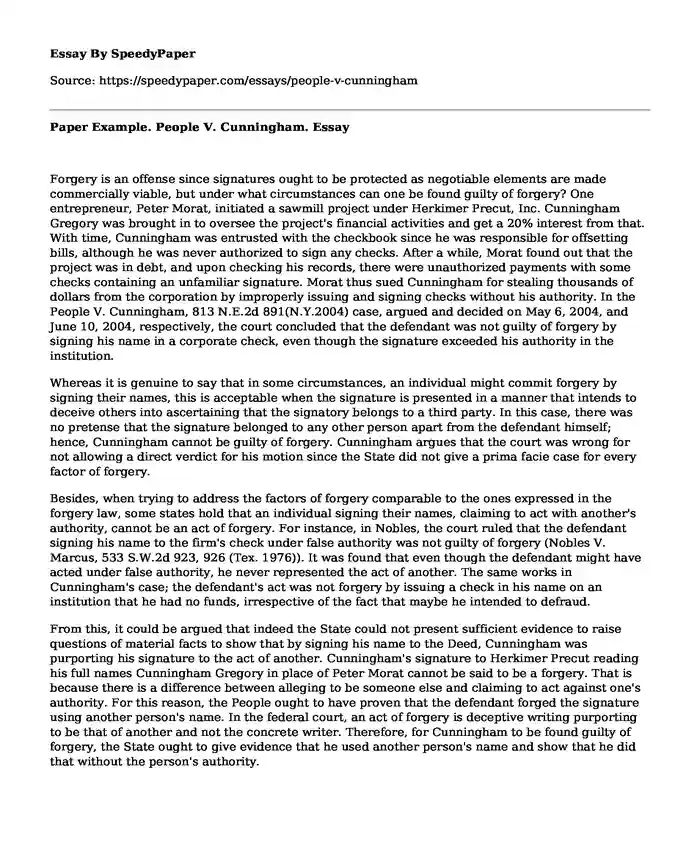
| Type of paper: | Essay |
| Categories: | Court system Judicial system Money |
| Pages: | 3 |
| Wordcount: | 585 words |
Forgery is an offense since signatures ought to be protected as negotiable elements are made commercially viable, but under what circumstances can one be found guilty of forgery? One entrepreneur, Peter Morat, initiated a sawmill project under Herkimer Precut, Inc. Cunningham Gregory was brought in to oversee the project's financial activities and get a 20% interest from that. With time, Cunningham was entrusted with the checkbook since he was responsible for offsetting bills, although he was never authorized to sign any checks. After a while, Morat found out that the project was in debt, and upon checking his records, there were unauthorized payments with some checks containing an unfamiliar signature. Morat thus sued Cunningham for stealing thousands of dollars from the corporation by improperly issuing and signing checks without his authority. In the People V. Cunningham, 813 N.E.2d 891(N.Y.2004) case, argued and decided on May 6, 2004, and June 10, 2004, respectively, the court concluded that the defendant was not guilty of forgery by signing his name in a corporate check, even though the signature exceeded his authority in the institution.
Whereas it is genuine to say that in some circumstances, an individual might commit forgery by signing their names, this is acceptable when the signature is presented in a manner that intends to deceive others into ascertaining that the signatory belongs to a third party. In this case, there was no pretense that the signature belonged to any other person apart from the defendant himself; hence, Cunningham cannot be guilty of forgery. Cunningham argues that the court was wrong for not allowing a direct verdict for his motion since the State did not give a prima facie case for every factor of forgery.
Besides, when trying to address the factors of forgery comparable to the ones expressed in the forgery law, some states hold that an individual signing their names, claiming to act with another's authority, cannot be an act of forgery. For instance, in Nobles, the court ruled that the defendant signing his name to the firm's check under false authority was not guilty of forgery (Nobles V. Marcus, 533 S.W.2d 923, 926 (Tex. 1976)). It was found that even though the defendant might have acted under false authority, he never represented the act of another. The same works in Cunningham's case; the defendant's act was not forgery by issuing a check in his name on an institution that he had no funds, irrespective of the fact that maybe he intended to defraud.
From this, it could be argued that indeed the State could not present sufficient evidence to raise questions of material facts to show that by signing his name to the Deed, Cunningham was purporting his signature to the act of another. Cunningham's signature to Herkimer Precut reading his full names Cunningham Gregory in place of Peter Morat cannot be said to be a forgery. That is because there is a difference between alleging to be someone else and claiming to act against one's authority. For this reason, the People ought to have proven that the defendant forged the signature using another person's name. In the federal court, an act of forgery is deceptive writing purporting to be that of another and not the concrete writer. Therefore, for Cunningham to be found guilty of forgery, the State ought to give evidence that he used another person's name and show that he did that without the person's authority.
Work Cited
“People V. Cunningham, 813 N.E.2d 891(N.Y.2004)". Courts.State.Ny.Us, 2020, http://www.courts.state.ny.us/Reporter/3dseries/2004/2004_04788.htm. Accessed May 19, 2020.
Cite this page
Paper Example. People V. Cunningham.. (2023, Aug 06). Retrieved from https://speedypaper.com/essays/people-v-cunningham
Request Removal
If you are the original author of this essay and no longer wish to have it published on the SpeedyPaper website, please click below to request its removal:
- Free Essay Sample on Perfect Recidivism Reduction Techniques
- Free Essay on How Legalizing Cannabis Impacts the Criminal Justice System
- Free Essay. How the Convict Labor System Was Worse Than Slavery
- Essay Sample on Understanding Consumer and Business Buyer Behaviour
- Free Essay Example: The Consumer Learning Theories
- Paper Example on Over-representation of Aboriginals in the CJS
- Products and Branding. Free Essay
Popular categories




